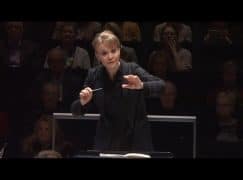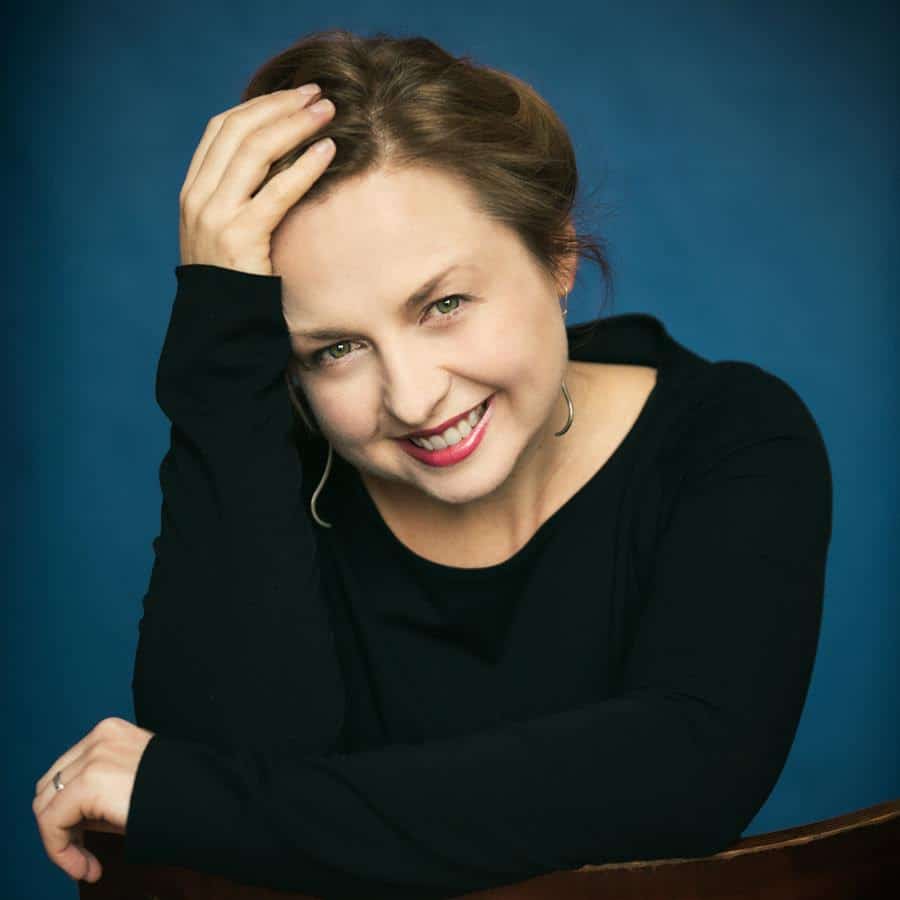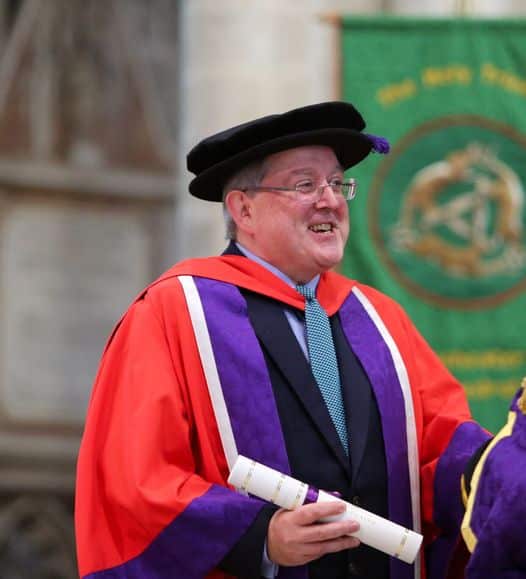Susanna Mälkki: I am at a turning point
NewsThe Finnish conductor, an outside contender for philharmonic vacancies in New York and Munich, tells BR Klassik she has other ideas. Notably in opera.
‘I would like to conduct a different repertoire. I’ve done a lot of contemporary music, a lot of modern music from the 20th century. I recently conducted Bruckner, so I got more into the big repertoire. I want to do that more. And of course the great Mahler works.
On the other hand, and this is very exciting for me, I would like to conduct more opera. This is a long cherished dream of mine. I’ve actually conducted operas again and again over the years, but many don’t know me because it wasn’t my identity until now. I love working with singers and there is so much repertoire to explore. And I love the dialogue between the orchestra and the stage, the combination of text and music. It’s really very fulfilling. That’s why there will be a little more opera in the future.
‘I am at a turning point. I think conductors’ careers are usually long. Of course I’m happy to work with a new orchestra. On the other hand, working as a freelancer is really a lot of fun. But if you want to delve deeper, it’s good to work together on a long-term basis. And that’s really something I’m hoping for….’
Read on here.






Time for turning over a new leaf unter den Linden!
Another glove in the ring for succeeding Barenboim, hear hear, Berlin Senate – culturally currently governed by a moderate socialist – is counting one more female option.
“‘I would like to conduct a different repertoire.”
Translation:
“Stop giving me that contemporary crap, I did it to get my career started with Boulez as my mentor, who gave me entrée into his rarified world of top orchestras, so I’ve paid my dues, basta, enough is enough, do you think anyone actually likes conducting these skull numbing pieces? Give me Mahler, Bruckner, the grand operas, the big romantic lush beautiful pieces people actually enjoy, and no more stuff people suffer through because, like medicine, it’s supposed to be good for you.”
Only drawback, Mahler and Bruckner wrote no operas.
And wasn’t Segerstam her teacher?
Her big break was as MD of the Ensemble Intercontemporain founded by Boulez and where he remained the towering figure.
No,he wasn´t. Panula was her teacher.
Wasn’t Panula everybody’s teacher? 😉 And the other two were Musin and Svarovsky, but both are dead.
Or, alternatively, “I’d like very much to have an identity of my own, not only ‘that modern conductor’ who can only do one thing”.
No one complained that Gardiner “did [baroque] just “to get [his] career” when he suddenly started doing Berlioz and stuff.
Plenty of conductors have deep specialties. That doesn’t mean they can only do one thing. And indeed, to be an MD of an orchestra/opera, it isn’t enough to be one of the best in a niche repertoire – you have to be a generalist.
Obviously, they have made her an offer she cannot refuse.
That someone with Ms. Malkki’s resume is looking to re-focus their conducting career at 53 is imo further proof that the early 20th-century training paradigm of learning in the opera house was invaluable. I realize that supporting opera companies in small and medium-sized towns throughout the world is unrealistic but it is undeniable that it enabled the development of countless talented opera and symphonic conductors.
No, it’s not. It brought forth a lot of people who organize. Nothing more. The real background is, play an orchestra instrument at top level, in a good orchestra
You mean like Klemperer, Szell, Kleiber, Furtwangler, HvK…. One famous conductor said that conductors who play an orchestra instrument well are only able to focus on that section in a score. That said playing the piano well is supposed to be invaluable.
Absolute nonsense….Toscanini,Monteux,Munch,Kempe, Barbirolli.Ormandy….they all didn´t play piano well.but were fabulous instrumentalists…and they certainly didn´t focus on one section…..Today best are also all fabulous orchestra players…
First, invaluable doesn’t mean required. Second, the main thrust of the comment was regarding the value of experience in opera which Toscanini, who studied piano and composition from an early age as well as the cello, obviously had in spades and Monteux had with ballets. To argue that training requiring integrating dance/vocalist with an orchestra isn’t invaluable for leading a symphony orchestra is ridiculous. Last, Ormandy for one was always laser focused on the violins.
AKA, I’m available for the Berlin Komische job.
The interview is all about music and her future. The word “Frau” comes up only twice, when the interviewer quotes Munich’s mayor. No other discussion about female conductors. That’s progress.
Imagine: A conductor who wants to do what EVERYBODY ELSE does: Boring old Mahler and Bruckner. Lame.
Who says she wants to do *only* Mahler and Bruckner? Conductors are allowed to have more than one thing in their repertoire. Who knows, she might even throw in a (gasp) Mozart symphony once in a while!
whatever you all wrote here she is fabulous and for me the best among the youngsters (I don’t care if men or women I care for quality) – in Barcelona she conducted a fantastic Trittico (by far more exciting than the boring and loud non Italian one in Salzburg) – Brava Madame
Dudamel’s probably gonna leave LA soon, and when he does she has to be the replacement, right? Like, they’re not even gonna look elsewhere.
If they do, what did they make her conduct all those world premieres for?
maybe she realized living in the US, in LA, is a bit of a dystopian way to live, particularly for someone from a Nordic country? Better seek employment in a nice European metropolis?
(it’s also the reason why I believe Thielemann will not go to Chicago in any role where he has to spend there more than two weeks per year. He likes money too, but not that much.)
The secret to surviving Chicago is to go for in month in the autumn, and go for a month in the spring, when it’s actually quite nice, before the frigid Siberian winter, before the humid heatwave of summer.
The secret to surviving LA is to never go.
(True, you can’t spend too much time in America, out of sight out of mind, your career wilts, you’re better off in any provincial opera house in Germany than any major urban city in the US. People care in Germany, it matters.)
Summer is actually lovely in Chicago; maybe a heat wave or two (we average just 14 days of 90+ temps a year) but generally quite nice. Average high in July is 85F., 83 in August and that is at the airport. A bit cooler near the lake, where I take a swim every morning. And we have access to baseball teams in both the American and National League. From late July through the first half of September, Chicago is glorious.
Spring is actually a bit problematic. The prevailing wind off the lake can keep things a bit chilly well into May. And it may shock mary to learn that a lot of people care about their local orchestra in my city.
The comment about LA reminds me of articles where both Dudamel and Salonen remark that their first impression of the city was unsure, ambivalent or even negative. But LA did eventually grow on them. I believe James Conlon, a New Yorker, may have acclimated to LA and LA Opera more readily or easily.
In general, Los Angeles compared with elsewhere (in the US, etc) reminds me of the over 150 years of debating North America/the US compared with Europe. Or the argument that the New World lacks the grace, beauty, culture, history and economic track record of the Old World.
In intra-American terms, however, Chicago’s (NYC’s too) climate is way better than LA’s. California’s beaches are also no match for the shores of Lake Michigan (or, for that matter, the Hudson River, Rockaway Beach, etc).
Best of all, Chicago’s Orchestra Hall blows LA’s Walt Disney Concert Hall out of the water.
LA is amazing despite its challenges and so is its Philharmonic, classical programming and concert hall. Maestro Salonen is now in SF and Dudamel heads to New York after 17 years here. LA can and has nurtured and celebrated great talent for the world with a bit of help from Debra Borda (now in NY again). We Angelenos look forward to visits from other amazing orchestras here and our next conductor. Just avoid our summers and early Fall.
I have heard her twice in Mahler 9 and once in LvdE. Outstanding performances.